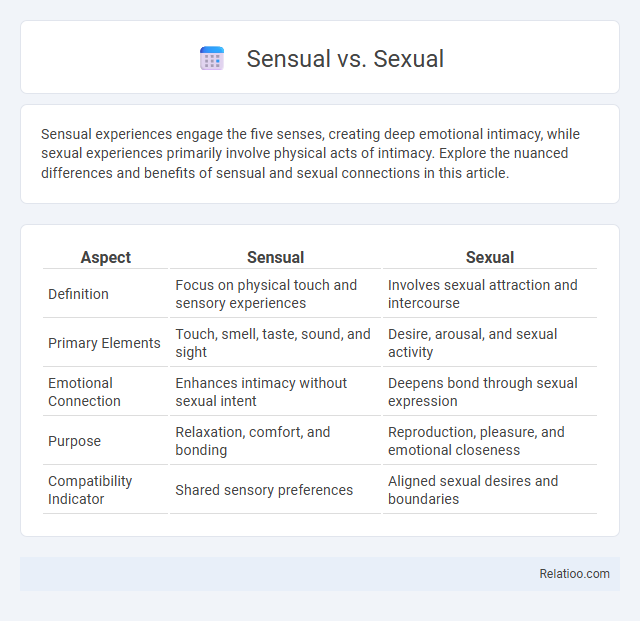Sensual experiences engage the five senses, creating deep emotional intimacy, while sexual experiences primarily involve physical acts of intimacy. Explore the nuanced differences and benefits of sensual and sexual connections in this article.
Table of Comparison
| Aspect | Sensual | Sexual |
|---|---|---|
| Definition | Focus on physical touch and sensory experiences | Involves sexual attraction and intercourse |
| Primary Elements | Touch, smell, taste, sound, and sight | Desire, arousal, and sexual activity |
| Emotional Connection | Enhances intimacy without sexual intent | Deepens bond through sexual expression |
| Purpose | Relaxation, comfort, and bonding | Reproduction, pleasure, and emotional closeness |
| Compatibility Indicator | Shared sensory preferences | Aligned sexual desires and boundaries |
Understanding the Difference: Sensual vs Sexual
Sensual relates to the enjoyment or indulgence of the senses, emphasizing touch, taste, sight, sound, and smell, while sexual specifically pertains to physical intimacy, reproduction, and sexual activity. Sensuality is the quality or state of being sensual, involving emotional and sensory experiences that may or may not involve sexual desire. Understanding the distinction between sensual and sexual helps individuals recognize that sensual experiences can enhance well-being and intimacy without necessarily involving sex.
Defining Sensuality: Engaging the Senses
Sensuality involves the appreciation and enjoyment of sensory experiences, engaging touch, taste, sight, sound, and smell to enhance pleasure and connection. It differs from sexuality, which centers on physical intimacy and sexual desire, while sensuality emphasizes heightened awareness and enjoyment of the body's sensory input. Defining sensuality requires focusing on how the senses create emotional and physical responses that enrich human experience beyond explicit sexual activity.
What Does Sexual Mean? Exploring Its Core
Sexual refers to anything related to sex, encompassing biological, physical, and emotional aspects tied to reproduction and intimacy. It involves behaviors, identities, and expressions connected to sexual attraction, activity, and function. Understanding sexual meaning highlights the complex interplay between physiology, psychology, and cultural norms defining human sexuality.
Sensual Experiences: Everyday Examples
Sensual experiences engage your senses through everyday moments like the warmth of sunlight on your skin, the aroma of fresh coffee, or the soothing sound of rain, emphasizing pleasure derived from bodily sensations rather than explicit sexual activity. Sensuality encompasses this broader appreciation of sensory enjoyment, whereas sexual relates specifically to physical intimacy and erotic desire. Understanding these distinctions enhances your ability to recognize and cultivate non-sexual sensory pleasures that enrich daily life.
Sexual Intimacy: Beyond the Physical Act
Sexual intimacy encompasses emotional connection, mutual trust, and vulnerability beyond the physical act, fostering deeper bonds between partners. Sensual experiences engage the senses and promote closeness through touch, taste, smell, and visual stimuli without necessarily leading to sexual activity. Differentiating sensuality from sexual intimacy highlights the importance of emotional presence and communication in cultivating fulfilling, multi-dimensional relationships.
Psychological Aspects: Sensual vs Sexual Desires
Sensual desires originate from the brain's limbic system, driving pleasure through tactile, olfactory, and auditory stimuli that engage the senses and evoke emotional intimacy without necessarily involving sexual arousal. Sexual desires are primarily linked to hormonal activity in the hypothalamus, triggering physiological responses aimed at reproduction and sexual gratification. Sensuality encompasses the broader capacity to experience and express these sensory pleasures, influencing psychological well-being by enhancing emotional connection and reducing stress.
Communication in Relationships: Sensual vs Sexual Needs
Understanding the distinction between sensual and sexual needs is crucial for effective communication in relationships. Sensual needs involve experiencing pleasure through the senses, such as touch, taste, and sight, while sexual needs specifically relate to physical intimacy and sexual expression. Addressing both aspects openly allows you to foster deeper emotional connections and maintain a balanced, fulfilling partnership.
Cultural Perceptions: Differentiating Sensual and Sexual
Cultural perceptions often distinguish sensuality as the appreciation of touch, taste, sound, and other senses that evoke pleasure without necessarily implying sexual intent, while sexuality is directly linked to sexual attraction, behavior, and identity. Sensual experiences may be embraced in many societies through art, music, or food, highlighting human connection beyond physical desire, whereas sexual expression is subject to stricter norms and moral judgments. Understanding these differences helps you navigate social contexts with awareness of how cultural values shape the acceptance and interpretation of sensual versus sexual behavior.
Enhancing Connection: Blending Sensuality and Sexuality
Blending sensuality and sexuality enhances your connection by deepening physical intimacy and emotional resonance. Sensuality involves engaging the senses through touch, sight, and sound, while sexuality focuses on sexual desire and activity, creating a comprehensive experience. Emphasizing both elements fosters a richer, more fulfilling bond in relationships.
Finding Balance: Healthy Expressions of Sensual and Sexual Energy
Exploring the distinctions between sensual, sexual, and sensuality helps you find balance in expressing your desires healthily. Sensuality involves engaging the senses through touch, taste, smell, sight, and sound to create pleasure beyond purely sexual intent, while sexual energy focuses on intimate connection and physical arousal. Integrating both by honoring your emotional boundaries and physical needs fosters a holistic and fulfilling experience of your body and relationships.

Infographic: Sensual vs Sexual
 relatioo.com
relatioo.com